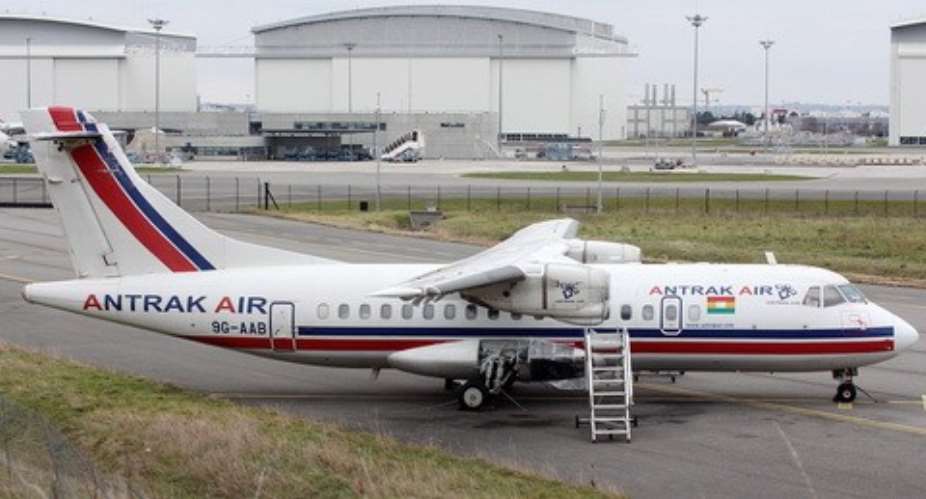The Ghana Civil Aviation Authority (GCAA) on Wednesday instituted investigations into the Antrak Aircraft 9G-AAB that was spotted with smoke coming from one of its engines before take off in Tamale.
GCAA Official told the Ghana News Agency in Accra, Antrak Air's repair team have also moved to site to assist GCAA Inspectors to investigate the incident.
The official explained that GCAA conducts routine unannounced checkups on aircraft's although the airlines conduct their own daily checks before take-off.
Explaining the recent Antrak Air incident at Tamale Airport which led to the cancellation of its flight to Accra, the GCAA officials said even though the Authority does not have a permanent inspector at the regional airport, its mandatory for the Aircraft officials to conduct thorough inspection before take-off.
Meanwhile the GCAA has noted that checks from Antrak Air indicate that the officials at the Tamale Airport went through the routine take-off checkups... and “all approved procedures for inspections were conducted on the aircraft 9G-AAB”.
The GCAA explained that during start-up of the right engine, the crew observed smoke coming from the engine and conducted a precautionary shut down after which all passengers and crew were safely evacuated and the aircraft secured.
The GCAA reiterated that the aircraft was not burnt down and neither was there any loss of life or damage to property as reported by some sections of the media.
Mr Oduro Sarpong, Sales Manager at Antrak Air, a domestic airline on Tuesday discounted claims by some media houses that their aircraft scheduled to fly from Tamale to Accra in the morning had caught fire.
He said there had never been a fire on the aircraft as reported but that the captain on starting the aircraft detected smoke coming from the engine and immediately shut it down.
Mr Sarpong said passengers were not “evacuated” as had been reported but disembarked when the engine was shut off.
“At no time did the captain see a fire and at no point were the lives of the passengers in danger, the situation was not life threatening,” he stated.
Mr Sarpong explained that several factors could cause smoke in the engine including rubbing together of metal, oil dropping on hot metal or fire, adding that, their engineers had been dispatched to the site to determine the cause of the smoke.





 Former Kotoko Player George Asare elected SRC President at PUG Law Faculty
Former Kotoko Player George Asare elected SRC President at PUG Law Faculty
 2024 elections: Consider ‘dumsor’ when casting your votes; NPP deserves less — P...
2024 elections: Consider ‘dumsor’ when casting your votes; NPP deserves less — P...
 You have no grounds to call Mahama incompetent; you’ve failed — Prof. Marfo blas...
You have no grounds to call Mahama incompetent; you’ve failed — Prof. Marfo blas...
 2024 elections: NPP creates better policies for people like us; we’ll vote for B...
2024 elections: NPP creates better policies for people like us; we’ll vote for B...
 Don’t exchange your life for wealth; a sparkle of fire can be your end — Gender ...
Don’t exchange your life for wealth; a sparkle of fire can be your end — Gender ...
 Ghana’s newly installed Poland train reportedly involved in accident while on a ...
Ghana’s newly installed Poland train reportedly involved in accident while on a ...
 Chieftaincy disputes: Government imposes 4pm to 7am curfew on Sampa township
Chieftaincy disputes: Government imposes 4pm to 7am curfew on Sampa township
 Franklin Cudjoe fumes at unaccountable wasteful executive living large at the ex...
Franklin Cudjoe fumes at unaccountable wasteful executive living large at the ex...
 I'll 'stoop too low' for votes; I'm never moved by your propaganda — Oquaye Jnr ...
I'll 'stoop too low' for votes; I'm never moved by your propaganda — Oquaye Jnr ...
 Kumasi Thermal Plant commissioning: I pray God opens the eyes of leaders who don...
Kumasi Thermal Plant commissioning: I pray God opens the eyes of leaders who don...
